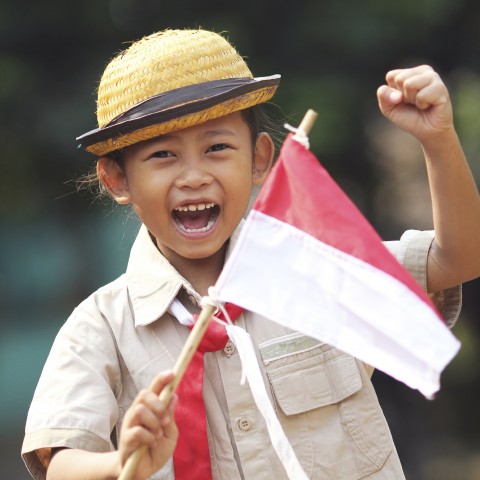Each year, Indonesia observes National Children’s Day (or more informally, National Kids Day). This is a day for Indonesians to remember the importance and indispensability of children for the country’s future, and the future of the world. Furthermore, Children’s Day is a good time to reflect on education in Indonesia, as well as children’s rights in Indonesia. Another benefit of realizing children’s potential on this day is urging an end to child exploitation in Indonesia.
In learning about National Children’s Day, you’re allowing yourself a better glance at Indonesian culture, family values in Indonesia, and even the family system in Indonesia! Understanding a country’s culture is one of the most important steps in mastering its language, and at IndonesianPod101.com, we hope to make this learning journey both fun and informative!
1. What is National Children’s Day in Indonesia?
National Children’s Day is an important national day that has been commemorated since 1986. National Children’s Day was the idea of the late Soeharto, the second president of the Republic of Indonesia, who regarded children as assets for the nation’s development.
2. When is National Children’s Day in Indonesia?
So, when is Children’s Day? In 1984, the Indonesian Government assigned July 23 as National Children’s Day, and Indonesia still observes it on this date.
3. Reading Practice: How is National Children’s Day Celebrated?
How do Indonesians celebrate their National Children’s Day? Read the Indonesian text below to learn about Children’s Day traditions, and what to expect! You can find the English translation directly below it.
—
Rangkaian peringatan Hari Anak Nasional biasanya telah dipersiapkan satu tahun sebelumnya oleh segenap komponen bangsa (Kementerian, Lembaga Pemerintah, swasta dan masyarakat) baik di pusat, propinsi, kabupaten/kota dan Perwakilan RI di Luar Negeri. Hal ini menunjukan keseriusan pemerintah dalam membina aset terpenting bangsa, yaitu anak.
Karnaval anak nusantara menjadi kegiatan yang tidak pernah absen dalam peringatan Hari Anak Nasional. Melalui karnaval ini, anak-anak diperkenalkan dengan berbagai suku bangsa dan adat budaya yang hidup di Indonesia. Anak-anak berbaris berpasang-pasangan sambil memperagakan pakaian daerah dari berbagai propinsi. Sementara itu di sisi jalan, penonton berdesakan menonton dan memberi semangat kepada para peragawan cilik. Karnaval ini juga dimeriahkan oleh marching band tingkat TK, tari-tarian tradisional, hingga shalawat rebana.
Festival permainan tradisional juga digelar untuk menghidupkan kembali permainan tradisional di era digital. Walaupun kini akrab dengan permainan digital modern, anak-anak tetap tertarik untuk mencoba berbagai permainan tradisional seperti jamuran, enggrang, gobak sodor, tekongan, dan petak umpet. Jenis-jenis permainan ini menanamkan nilai-nilai kerja sama kepada anak.
Salah satu permainan tradisional adalah lomba sepeda lambat. Berlawanan dengan balap sepeda, siapa yang paling terakhir sampai di garis akhir adalah pemenangnya. Tentu saja peserta yang jatuh di tengah jalan harus gugur.
—
The events for National Children’s Day commemoration are usually prepared in the preceding year by all segments of the nation (the Ministry, Governmental Institutions, the private sector, and society) at the central, the provincial, the regency/city governmental levels, as well as by the Indonesian Representatives Abroad. This shows the government’s seriousness in fostering the most important asset to the nation, which is children.
The Archipelago Children’s Carnival is never missed in the commemoration of National Children’s Day. Through this carnival, children are introduced to various ethnic groups and indigenous cultures living in Indonesia. The children march in couples exhibiting regional apparel from various provinces. Meanwhile, on the side of the road, the spectators crowd to watch and cheer the junior models. This carnival is also livened up by a kindergarten marching band, and the traditional dances to the Rebana Shalawat performance.
A traditional games festival is also held to revive traditional games in this digital era. Although modern digital games are more familiar, children are also attracted to trying various traditional games, such as jamuran, enggrang (stilts), gobak sodor, tekongan, and petak umpet (hide and seek). These games instill the value of cooperation in children.
One of these traditional games is the slow bicycle race. Unlike a usual bicycle race, whoever reaches the finish line last is the winner. Of course, the participants who fall along the track are dismissed.
4. My Balloon
Do you know what the most popular Indonesian children’s song is?
The answer is the Balonku (My Balloon) song. Here are the lyrics:
I have five balloons / All sorts of colors / Green, yellow, gray / Pink and blue / The green balloon explodes POP! / My heart is very disturbed (or confused) / I have four balloons left / I hold them tight.
5. Useful Vocabulary to Know for Indonesian Children’s Day
Here’s some vocabulary you should know for National Children’s Day in Indonesia!
- Hadiah — “Present”
- Pendidikan — “Education”
- Keluarga — “Family”
- Hari Anak Nasional — “National Children Day”
- Orang tua — “Parents”
- Hak — “Right”
- Kesejahteraan — “Welfare”
- Prestasi — “Achievement”
- Yatim piatu — “Orphan”
- Eksploitasi — “Exploitation”
- Kesetaraan — “Equality”
- Perlombaan — “Contest”
To hear each of these vocabulary words pronounced, check out our Indonesian National Children’s Day vocabulary list.
Conclusion
We hope you enjoyed learning about National Children’s Day in Indonesia with us! Did you learn anything new? Is there a similar holiday in your own country? Let us know in the comments!
To continue learning about Indonesian culture and the language, visit us at IndonesianPod101.com! We provide an array of fun and effective learning tools, including free Indonesian vocabulary lists and more insightful blog posts like this one. On our website, you can also chat with fellow Indonesian learners on our community forums, and with a Premium Plus account you can begin using our MyTeacher program!
Know that all of the hard work you’re putting into your Indonesian studies will pay off, and you’ll be speaking, reading, and writing Indonesian like a native before you know it!













